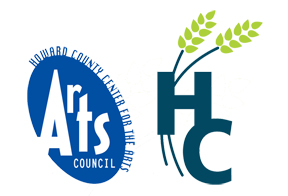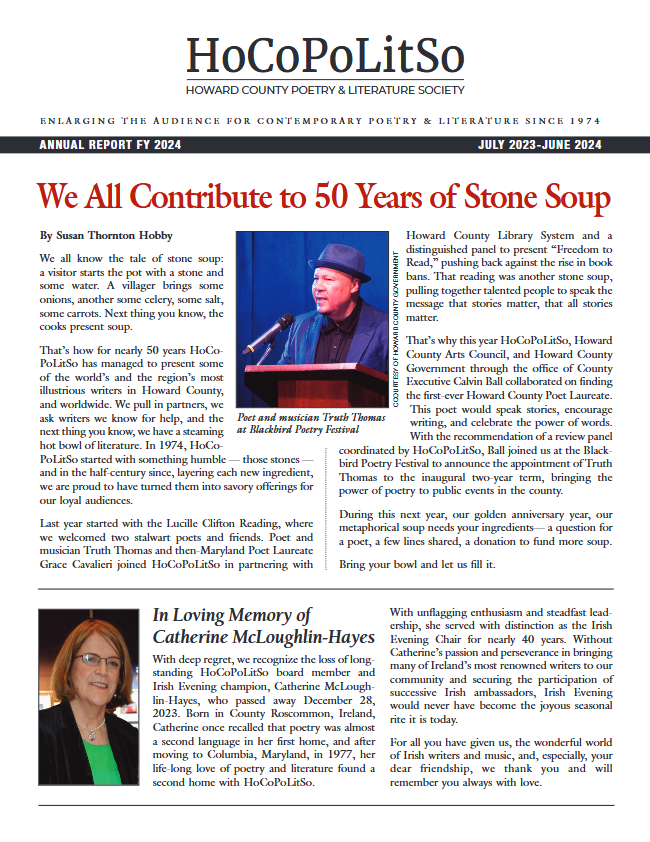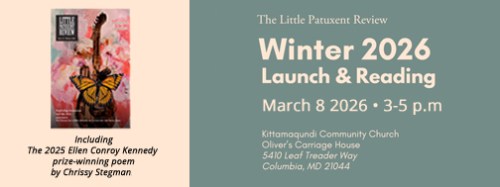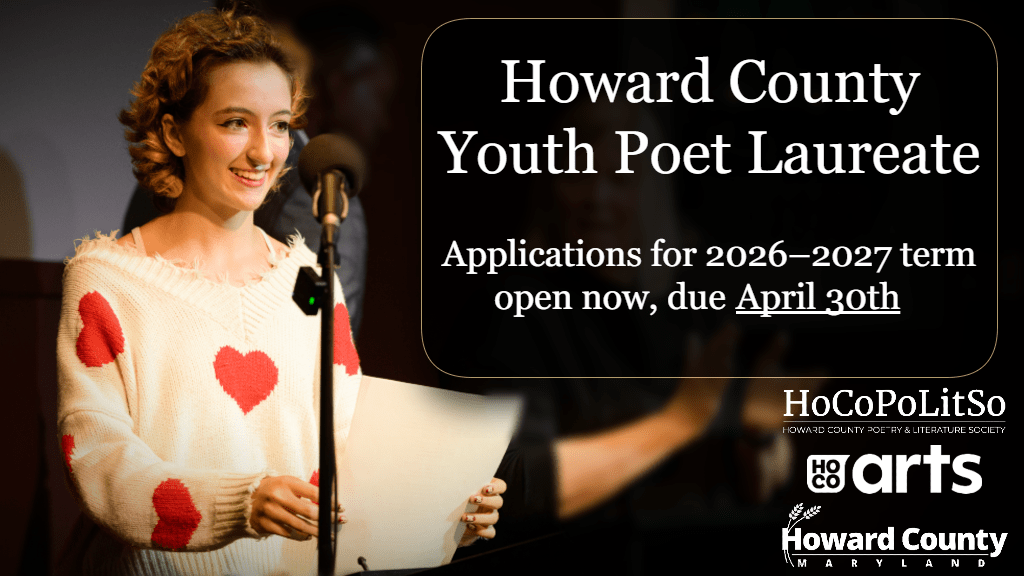Wilde Readers of March: Jean Burgess & Kris Faatz
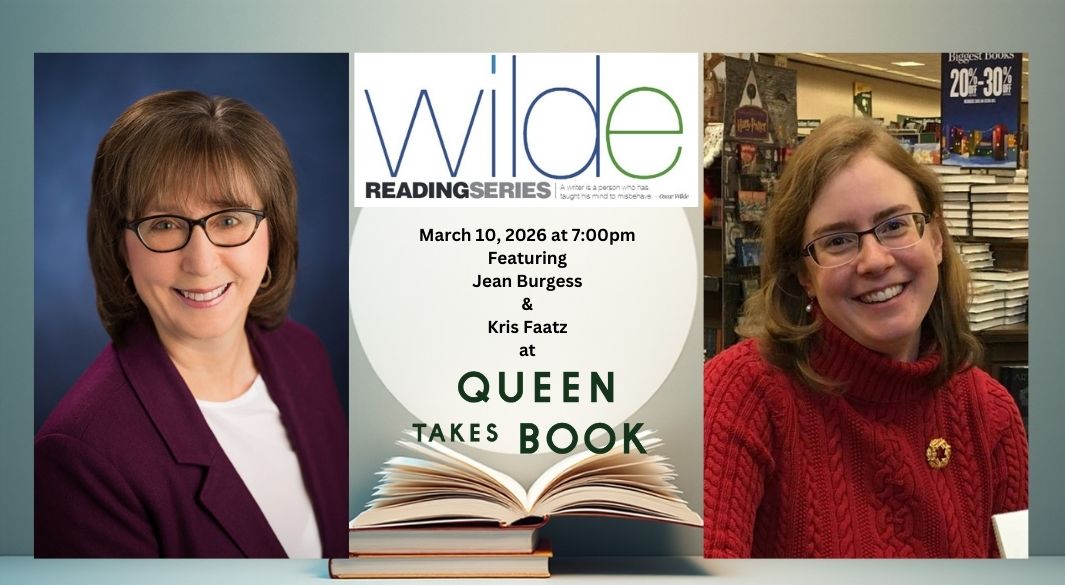
HoCoPoLitSo welcomes all to the March edition of the Wilde Reading Series, proudly continuing its ongoing tenth season of highlighting local authors in Howard County. This month’s reading features Jean Burgess and Kris Faatz, hosted by Linda Joy Burke. Please join us at independent bookstore Queen Takes Book on Tuesday, March 10th at 7 p.m., at 6955 Oakland Mills Rd, Suite E, Columbia MD, 21045. Please spread the word— bring your friends, family, and students!
Our warm and welcoming open mic follows the featured authors and we hope you will let us hear from your stories, poems, or other piece. Please prepare no more than five minutes of performance time (about two poems) and sign up when you arrive. Books by the featured authors will be available for purchase.
Below, get to know Jean and Kris!
Who is the person in your life (past or present) that shows up most often in your writing?
Jean: Me— I guess I’m still at the “write what you know” stage of fiction writing.
Kris: I’m not sure if there’s just one person! For my fictional protagonists, I often draw on people I’ve worked with, sometimes colleagues in the music world, sometimes people I’ve briefly met in my day job at a local garden shop (retail work offers excellent people-watching). I often write about family relationships, particularly between parents and children, and find myself creating parent figures like the ones I wish I’d had. I do sometimes put myself into my work too, particularly if I’ve had an experience I’d like to process. “Giving” that experience to a fictional character lets me create space from it and gain some insight.
Where is your favorite place to write?
Jean: My office because I use a lot of visual stimuli.
Kris: My desk in my office. The window looks out over the back yard and a narrow strip of woods. It’s restful to have greenery to look at. There’s usually at least one cat in my office too, offering encouragement/advice.
Do you have any consistent pre-writing rituals?
Jean: Coffee, review yesterday’s writing— sorry, nothing very exciting.
Kris: I often need a little bit of physical activity to get myself in the right frame of mind. Sometimes that means doing some quick housework or going up and down the stairs a couple of times, or even just walking around a room. Sometimes I like to go for a short walk outside. The activity helps clear the “noise” out of my mind and let me focus on the writing project.
Who always gets a first read?
Jean: My sister— she is fabulous at providing stimulating questions.
What is a book you’ve read more than twice (and would read again)?
Jean: Christina Baker Kline’s The Exiles and Jamie Ford’s Hotel at the Corner of Bitter and Sweet.
Kris: Pretty much anything by Terry Pratchett. I’ve read all of his “Discworld” books many times, and I revisit them regularly. NIGHT WATCH is a particular favorite: for my money, it’s the best of his books, though they’re all brilliant.
What is the most memorable reading you have attended?
Jean: Too many to limit to a single one. Sorry, is that a cop out?
Kris: When I was in high school, Maya Angelou came to a local university, and I was lucky enough to attend her presentation and reading. It was spellbinding. I remember how inspired I felt, discovering that words could have such power and create such depth of feeling. I could have listened to her for hours.
• Jean Burgess is an author, editor, playwright, and former theatre educator. She writes both nonfiction and fiction, enjoys presenting writing workshops and presentations, and volunteers as a facilitator with a local Teen Writing Club. Her next Retro novel, Navigating Her Next Chapter, will be released in April 2026 by Apprentice House Press. Jean holds a Masters in Theatre from Northwestern University and Ph.D. in Educational Theatre from New York University.
You can find Jean online at jeanburgessauthor.com.
• Kris Faatz (rhymes with skates) is a pianist and award-winning writer. Her short fiction has appeared or is forthcoming in journals including Atticus Review, Rappahannock Review, and South 85. Her third novel, Line Magic, was shortlisted for the Santa Fe Writers Project’s 2023 literary awards and released in 2025 by Highlander Press. Kris and her husband serve as staff to three cats and enjoy hiking and outdoor exploration.
Visit her online at krisfaatz.com, or check in on Facebook, @kristinfaatz, or Instagram, @krisfaatz.

Meet Jo Tyler, Second Place Winner of the 2025 Ellen Conroy Kennedy Poetry Prize
In 2021, Howard County Poetry and Literature Society launched the Ellen Conroy Kennedy Poetry Prize in honor of its founding member, Ellen Conroy Kennedy. Now in its fifth year, contest judges evaluated many submissions for mechanics and technique, clarity, style/music for our contemporary age, imagery/sensory power, and emotional resonance. Congratulations to this year’s runner up, Jo Tyler, and the poem “Ink”. Read on to learn a little about the this poet and to hear the poem recited. Congratulations to Jo!
Tell us about your poem, “Ink.” How did it come about? What sparked or inspired it?
For the last 3 years I’ve met just about every Thursday morning with a fabulous group of poet-friends for a generative writing session. We take turns hosting, sharing a poem or a piece of visual art we like and providing a small assortment of writing prompts derived from it. “Ink” got its start on one of these Thursday mornings from a series of photographs I took at The Museum of Everyday Life in Glover, Vermont, way up north. There was, among other things, an amazing collection of lists visitors had made as part of an interactive exhibition. If you haven’t ever been to the museum, I recommend it. It’s quite an experience.
What was an early experience in which you learned that language had power?
There are two experiences competing to be told here. The first one that comes to me is the first time I swore out loud. At my mother. I was six. I begged her to forgive me because I didn’t want to go to Hell. Now I don’t believe in Hell so I swear as needed, usually to get someone’s attention. The second experience is more formalized and more performative. In seventh grade I was selected to recite The Gettysburg Address from memory on Memorial Day. My English teacher coached me for weeks, teaching me how inflection and silences help words shine. On the day, the parade came to a pause at the library green, and I stood before a microphone in a new dress and patent leather shoes. The whole town was there, and the whole town was quiet. I could feel them listening. I could feel the importance of Lincoln’s language in that listening, and I also knew that in that moment the whole town was on my side, willing me not to make a mistake. And I didn’t. It was seventh-grade-glory. I think that experience accounts for my ongoing delight in sharing my work out loud, giving it a life beyond the one it has on the page
As a writer, what would you choose as your avatar / mascot / companion animal?
So many choices. I mean my dog Moxie is a faithful and favorite companion, and he’s jockeying for first place, but that seems too easy. I’m going to go with a snake, maybe a friendly one like a corn snake. I’m choosing a snake because they brumate. They slow down their metabolism, like mammals in hibernation, but their sleep isn’t as deep, and they have more options to wake up, drink, stretch, when there’s a warm spell. I like that. Sometimes my poems need to hibernate, but mostly they I think they benefit from brumation. If I encounter something in the world that makes me think of a poem I’ve set aside for a time, I might gently shake that poem awake, do some revising in the moment, give it a sip of water and then let it rest some more. I think too, that snakes are a good metaphor for poetry, because of the ways that they can slip around so smoothly, curl, elongate, contract, surprise. Corn snakes aren’t inclined to bite, but they can if they need to. I think some of my poems are like that.
Tell us about a writer or book that you return to over and over for inspiration.
I’d say Mary Oliver for sure. I know she’s not everyone’s cup of tea, but she lowers my heart rate and her simplicity in conveying complexity feels so masterful to me. She can do it all, form, free verse, long, short, and always perfectly pared down. Her imagery is so clear, stark, fearless and heartbreaking in the face of mystery. There’s something magical about how she fully welcomes her reader to the poem, how she invites us directly into her experience, engages us in it. Mary Oliver doesn’t make her reader contort, lean, peer in, surmise from an angle. Rather we encounter her experience at her side, joining with her in the delight, the sadness, and the surprise not as an outsider, but as a friend. I want my readers to feel this way – welcome, with no distance between us
What are you working on next and where can we find you?
I’m finishing up a collection that I’m going to let brumate for the rest of winter, and revise over the summer with a goal of submitting it in the fall 2026 “season” of contests and calls. I have a chapbook called Rooms for Love from Bottlecap Press available at this link: https://bottlecap.press/products/roomjt and I’m working on two others. You’ll find some of my individual poems in Yellow Arrow Journal, Maryland Literary Review, MacQueen’s Quinterly and Pen in Hand. And if you ever want to hear my work, I’m pretty much a regular at some of the open mics in the Baltimore area, like The Hot L, Manor Mill, Maryland Writer’s Association and of course the Wilde Reading Series! We’re so lucky to have such great venues in Maryland, and such great writers. I hope to see you out and about sometime soon!
Sarah Kay to Feature at 18th Annual Blackbird Poetry Festival
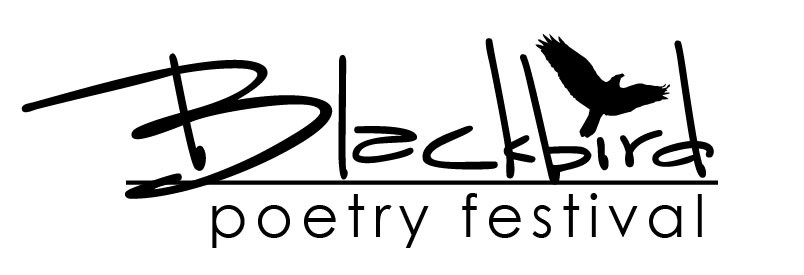
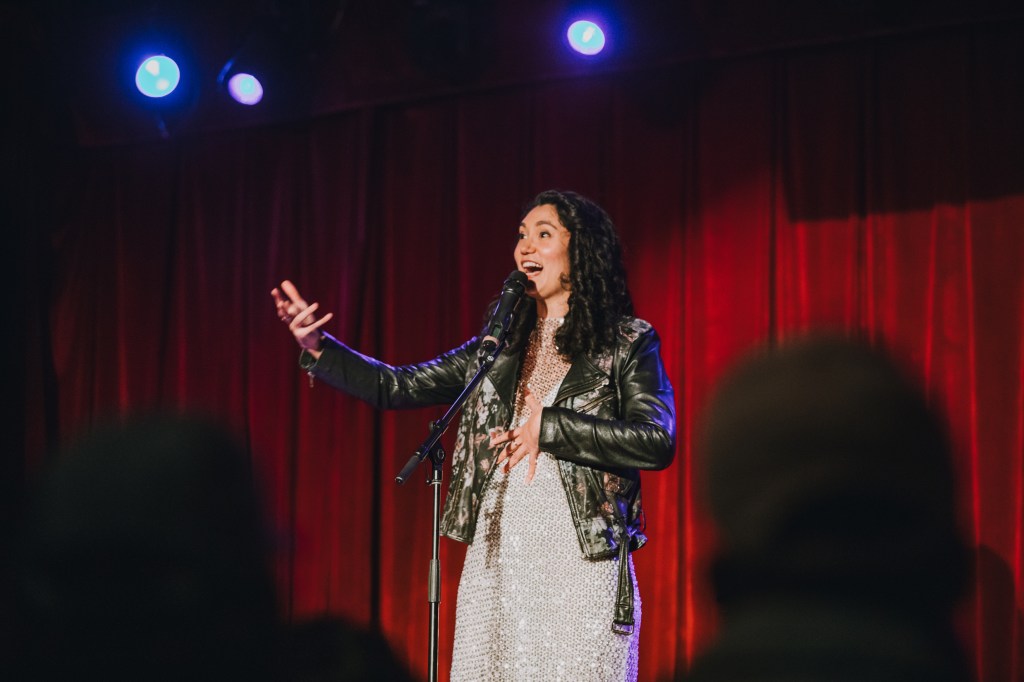
Sarah Kay headlines this year’s Blackbird Poetry Festival to be held on April 23rd, 2026, on the campus of Howard Community College (HCC). Now in its 18th consecutive year, the festival is a day devoted to verse, presented in partnership between HoCoPoLitSo and HCC’s Departments of Student Life and Humanities/World Languages, including a writing workshop, multiple readings, HCC’s poetry patrol, a recording session of HoCoPoLitSo’s writer-to-writer talk show The Writing Life, appearances from the Howard County Poet Laureate and Youth Poet Laureate, and much more.
This year, all event segments will be held in the Kittleman Room of Duncan Hall (DH-100), starting off with the 11 a.m. Morning Songs Writing Workshop, hosted by Howard County’s inaugural Poet Laureate, Truth Thomas, on the Skinny— the dynamic poetic form which he created and is now taught worldwide. The 2 p.m. Sunbird Reading features readings from special guest Sarah Kay and Howard County Youth Poet Laureate Penelope Tofigh, followed by a poetry open mic for local authors of all ages. Attendance to the daytime events is free and open to the public, while seating lasts; current HCC students and faculty may find registration links for credits on the college event page.
Finally, the festival culminates its daylong celebration of poetry with the Nightbird Reading at 7 p.m., again in the Kittleman Room. Nightbird will feature Sarah Kay, introduced by poet Teri Ellen Cross Davis following their conversation on the set of HoCoPoLitSo’s The Writing Life, with a reception, book sale and signing to follow the readings. General admission to Nightbird is available NOW while seating lasts for $25 per person, with discounted rates available for educators and students. For questions or issues purchasing tickets, to request accommodations, or to discuss attendance by a larger group, please contact HoCoPoLitSo via e-mail to info@hocopolitso.org, or by phone call to (443) 518-4568. Proceeds support the live and recorded literary programs offered by HoCoPoLitSo for student and general audiences.
HoCoPoLitSo is a 501(c)(3) nonprofit organization (FEIN 52-1146948) registered in the state of Maryland, donations to which are tax-deductible to the fullest extent allowed by law. A copy of our current financial statement is available upon request. Documents and information submitted to the State of Maryland under the Maryland Charitable Solicitations Act are available from the Office of the Secretary of State for the cost of fees and postage.
HoCoPoLitSo is supported in part by funds gratefully received from the Maryland State and Howard County Arts Councils; Howard County Government; Community Foundation of Howard County; Dr. Lillian Bauder; and from numerous other, generous individual and corporate contributors. The Howard County Poet Laureate and Youth Poet Laureate programs are administered in partnership between HoCoPoLitSo, Howard County Arts Council, and the Office of the Howard County Executive. The artistic contents and opinions expressed at HoCoPoLitSo events do not necessarily reflect the views or policies of HoCoPoLitSo’s grantors, donors, or individual Board or staff members.
Meet Chrissy Stegman, Winner of the 2025 Ellen Conroy Kennedy Poetry Prize.
In 2021, Howard County Poetry and Literature Society launched the Ellen Conroy Kennedy Poetry Prize in honor of its founding member, Ellen Conroy Kennedy. Now in its fifth year, contest judges evaluated many submissions for mechanics and technique, clarity, style/music for our contemporary age, imagery/sensory power, and emotional resonance. Congratulations to first place winner this year, Chrissy Stegman, and the poem “Please Be Kind, Rewind”. Read on to learn a little about the this poet and to hear the poem recited. Stegman was runner up for the 2022 Ellen Conroy Kennedy Poetry Prize. Congratulations to the poet!
Tell us about your poem, “Please Be Kind, Rewind.” How did you balance the gravitas of its content with its formal charm?
The formal constraints of “Please Be Kind, Rewind” are not ornamental, more they function as a kind of psychic architecture. The poem’s reversals, repetitions, and palindromic logic enact the speaker’s denial of the loss event itself. By fracturing the experience into segments, into units that can be read forward, backward, or laterally, my poem resists narrative finality. There is no single, forward-moving version of what happens. The loss is broken into parts small enough to be handled, rearranged, yet almost disguised.
Because the poem is designed to be read in reverse at its close, the reality the speaker gestures toward never fully arrives. The catastrophe is perpetually deferred. In this sense, the form becomes a strategy of hiding: the speaker is always just before the moment of recognition, always rewinding to the last place where hope still exists. The music and symmetry create a kind of inertia where transformation does not lead to release but to suspension. Grief is present everywhere, but it is never allowed to complete itself.
Talk a little bit about your process. How does the spark find you and then make its way into a poem?
The spark usually comes through language before the meaning, like in an image, a sound, a misreading, a word that tilts and becomes something else. I’m interested in what happens when words collide or misbehave, when sound begins to generate sense rather than merely accompany it. A phrase will catch because of its music or its pressure, and I’ll carry it around, letting it accrue associations. Like most poets, I’m obsessive about words, their textures, their echoes, the way one word calls another into the room.
So I play in that space. I rarely sit down determined to write a particular poem. Sometimes there’s a memory I’m curious about, but I rarely begin thinking, I need to write about this. I also write a lot of ekphrastic poetry because I’m drawn to color and to art as a medium. It’s easy to imagine a different story from a painting. I enjoy casting old scenes into new landscapes. I often think, while writing: why not? I am fascinated by transformation.
If you could turn yourself into a metaphor, what would it be and why?
This was such a fun question! I’d probably be a VHS tape that’s been recorded over too many times, weddings, footage of a farm, home movie of a dog, emergency broadcast, all bleeding into one another. A little warped for sure, a little ghost-y, but still functional. Still holding.
Tell us about a new poet or book of poems that you’ve come across that stopped you in your tracks.
Susan Leary’s Dressing the Bear stopped me immediately. The poems are intimate without being precious, emotionally astute without over-explaining themselves. What struck me first was her lyric precision and sonic control. What she does with sound is impressive work. The lines are attentive to cadence and pressure, to what repetition can hold, to how music can sharpen rather than soften emotional impact.
The book also landed with particular force for me because of its attention to loving someone who is struggling, especially when that struggle is shaped by addiction and unfolds within a family system. There is a deep, aching intelligence in the way the poems hold love alongside harm and responsibility alongside helplessness.
What are you working on next and where can we find you now?
I’m finishing a full-length manuscript while staying open to the world around me, or at least I hope! Working, looking, paying attention. Alongside that, I’ve completed a second chapbook and am currently looking for the right publisher for it. You can also find me at my website: www.chrissystegman.com
I’ve also begun exploring a 1940s Purma camera, a British camera designed to relinquish control: it rotates internally, making each exposure dependent on chance and gravity rather than intention. I’m drawn to it as a practice I’m still learning, a way of seeing that resists mastery. I’m curious about how its unpredictability might begin to inform my poems rather than simply accompany them.
In addition, I’m experimenting with stop-motion animation and linocut, interested in what happens when poems leave the page!
I’m also very aware that my creative life is inseparable from my domestic one. I’m the mother of five children, which means my days are structured around attention, interruption, negotiation, and wondering why I came into a room. Somewhere between packing lunches, locating lost shoes, and refereeing minor domestic epics, the poetry work continues.
Chrissy Stegman is a three-time Best of the Net and Pushcart-nominated poet and writer from Baltimore, Maryland. Recent work has appeared in Rattle, River Heron Review, Jake, UCity Review, Gone Lawn, Gargoyle Magazine, Stone Circle Review, Fictive Dream, Inkfish, 5 Minutes, Libre, and BULL. Her chapbook, Somewhere, Someone Is Forgetting You, was published by Alien Buddha Press. She is a 2025 MVCWI Fellow and recipient of the Idyllwyld Arts Scholarship for Poetry and a finalist in the 2025 Wergle Flomp Humor Poetry Contest.
2026–2027 Howard County Youth Poet Laureate Applications Open Now
The Howard County Youth Poet Laureate is an honorary position formally appointed by the County Executive, who each year acts as an ambassador for the literary arts, amplifying the voice of youth expression in our community through participation in public events and readings throughout their one-year term. As we look forward to hearing from current laureate, Penelope Tofigh, at upcoming events including the Blackbird Poetry Festival, applications for the 2026–2027 academic year are open NOW for eligible young poets, ages 14–21, who either reside in or will be able to present at in-person events in Howard County. The next Youth Poet Laureate will serve from September 2026 until August 2027, and receives an honorarium of $500.
Eligible candidates may apply now by clicking HERE! The deadline for self-submitted applications is April 30, 2026. Full program guidelines can be found on the Howard County Arts Council grants homepage; for questions on the application process, please contact grantsandprojects@hocoarts.org, or by phone call to (410) 313-2787 during regular business hours. The Howard County Poet Laureate and Youth Poet Laureate Programs are a partnership of HoCoPoLitSo, Howard County Arts Council, and the Office of Howard County Executive Calvin Ball.
Wilde Readers of February: Alan Britt & G. H. Mosson
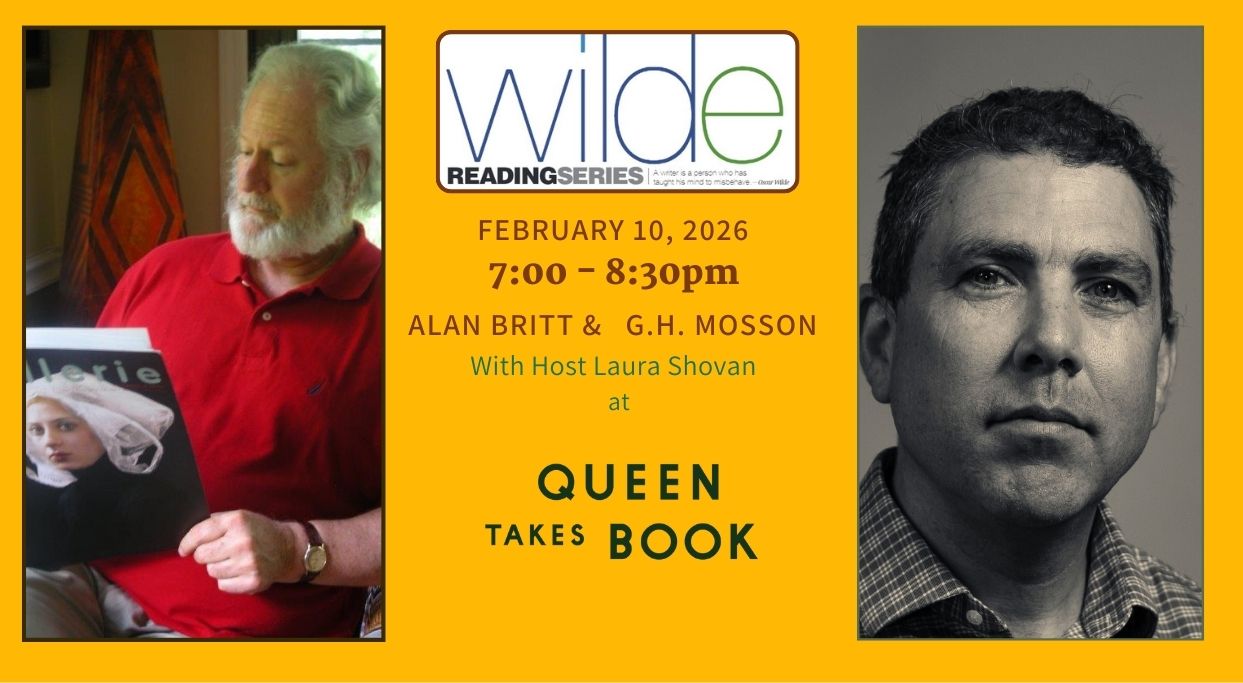
HoCoPoLitSo welcomes all to the February edition of the Wilde Reading Series, proudly continuing its ongoing tenth season of highlighting local authors in Howard County. This month’s reading features Alan Britt and G. H. Mosson, hosted by Laura Shovan. Please join us at independent bookstore Queen Takes Book on Tuesday, February 10th at 7 p.m., at 6955 Oakland Mills Rd, Suite E, Columbia MD, 21045. Please spread the word— bring your friends, family, and students!
Our warm and welcoming open mic follows the featured authors and we hope you will let us hear from your stories, poems, or other piece. Please prepare no more than five minutes of performance time (about two poems) and sign up when you arrive. Books by the featured authors will be available for purchase.
Below, get to know Alan and Mosson!
Who is the person in your life (past or present) that shows up most often in your writing?
Alan: William Blake.
Mosson: My poetry generally is imagistic more than narrative, not just in voice but in lyric expression. In my most recent book of poems, Singing the Forge (2025), there are six poems based on Whistler prints, and two based on sculptures by Henry Moore, so these artists win the hat of showing up the most. My children make two brief appearances at the end.
Where is your favorite place to write?
Alan: Outside in nature.
Mosson: From 2022 through 2026, my favorite place to write has been the chair beside my bed, with the sunrise peaking through the window, or that preface hue of blackish-green-bruise.
Do you have any consistent pre-writing rituals?
Alan: No.
Mosson: If I write, it most often early in the morning. It’s true, I’ve likely had coffee first.
Who always gets a first read?
Alan: Myself.
Mosson: Hmm, I read my own work first, indeed.
What is a book you’ve read more than twice (and would read again)?
Alan: The First Decade by Duane Locke.
Mosson: My favorite version of Walt Whitman’s Leaves of Grass is his first, 1855, which is available from Penguin Classics; while I have read it ten or more times; I surely will read it again. Well, I have just finished my second tour through the Collected Poems of C. P. Cavafy, the Greek Alexandrian poet, this time translated and arranged by Daniel Mendelsohn. This particular curation is wonderful, and I plan to read it again soon, so it’s about to qualify. I could go on.
What is the most memorable reading you have attended?
Alan: Tough! Perhaps Robert Bly’s reading with HoCoPoLitSo at Howard Community College. (In a writing workshop at Smith Theatre in 1997, co-sponsored with Columbia Festival of the Arts. —Ed.)
Mosson: I saw Gary Snyder talk as well as read at The Guggenheim Museum in NYC in conjunction with an Asian art exhibit, and the evening was an intellectual and aesthetic highlight combining art, lived ideas, and poetry. It is hard to forget hearing Allen Ginsberg along with several others read Whitman’s entire “Song of Myself” at St. John’s Church in NYC some decades ago. These two readings immediately come to mind, for sure. Further, I saw Stanley Kunitz read at the Library of Congress, which moved me, as has Li Young-Lee, twice.
• Alan Britt has been nominated for the 2021 International Janus Pannonius Prize awarded by the Hungarian Centre of PEN International for excellence in poetry from any part of the world. Previous nominated recipients include Lawrence Ferlinghetti, Charles Bernstein and Yves Bonnefoy. Alan has published 25 books of poetry and was interviewed at The Library of Congress for The Poet and the Poem. A graduate of the Writing Seminars at John Hopkins University, he currently teaches English/Creative Writing at Towson University.
• G. H. Mosson is the author of three books and three chapbooks of poetry, including Singing the Forge (David Robert Books, 2025), Family Snapshot as a Poem in Time (Finishing Line Press, 2019), and Questions of Fire (Plain View Press, 2009). His poetry has appeared widely in periodicals, and been nominated four times for the Pushcart Prize. He practices law, raises two wonderful kids, and enjoys day hikes.
His website, ghmosson.com, is a good place to start connecting, but right now he is very proud of his Baker Artist page.

Wilde Readers of January: Steven Leyva & Julia Tagliere
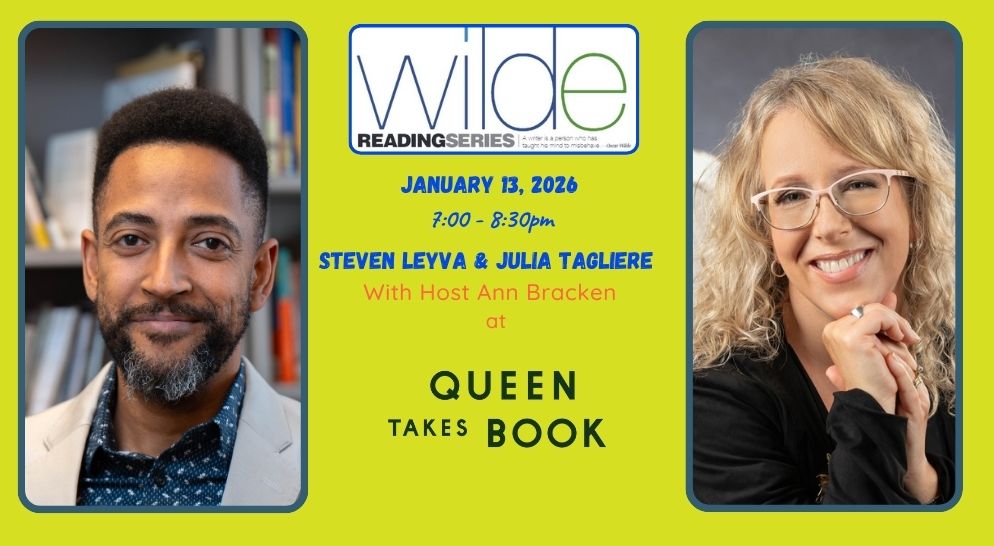
Happy New Year! As we enter 2026, HoCoPoLitSo invites all to the January edition of the Wilde Reading Series, proudly continuing its ongoing tenth season of highlighting local authors in Howard County. This month’s reading features Steven Leyva and Julia Tagliere, hosted by Ann Bracken. Please join us at independent bookstore Queen Takes Book on Tuesday, January 13th at 7 p.m., at 6955 Oakland Mills Rd, Suite E, Columbia MD, 21045. Please spread the word— bring your friends, family, and students! Light refreshments will be served and books by the readers available for purchase.
Our warm and welcoming open mic follows the featured authors and we hope you will let us hear from your stories, poems, or other piece. Please prepare no more than five minutes of performance time (about two poems) and sign up when you arrive.
Below, get to know Steven and Julia!
Who is the person in your life (past or present) that shows up most often in your writing?
Steven: Probably my brother or father.
Julia: My late mother.
Where is your favorite place to write?
Steven: My office at the University of Baltimore, through coffee shops used to be where I wrote most often.
Julia: Anywhere I can scrape together a few sustained hours to focus.
Do you have any consistent pre-writing rituals?
Steven: Hmm … not really. At least not in the way folks imagine a causal link from ritual to practice. Certainly watching animation is a part of it but I’d do that anyway. Reading poetry is part of it but again, I’d do that even if I wasn’t going to write. Perhaps the only pre-writing ritual is remembering presently that one is alive.
Julia: I always leave notes to myself when I stop a given day’s work (“Start with this scene next” or “Flesh out this interaction” or even just “This sucks—why?”). Music also helps me sort of cross over that bridge, can put me in the mood of whatever piece or section I’m working on that day.
Who always gets a first read?
Steven: Often it’s a colleague at work, Marion Winik, or my close friend Zakia Henderson-Brown.
Julia: I have a few trusted friends blessed with marvelous literary instincts I count on to provide for thoughtful, candid feedback.
What is a book you’ve read more than twice (and would read again)?
Steven: The Fellowship of the Ring.
Julia: East of Eden by John Steinbeck.
What is the most memorable reading you have attended?
Steven: A reading with Derek Walcott at 92Y in NYC.
Julia: The first I ever attended, hosted by The Inner Loop in D.C. Hearing the passion, courage, wit, and grace of those writers sharing their works, exactly as they themselves had conceived, completely electrified me. I was hooked.
• Steven Leyva was born in New Orleans, Louisiana and raised in Houston, Texas. His poems have appeared in Smartish Pace, Scalawag, Nashville Review, jubilat, The Hopkins Review, Prairie Schooner, and Best American Poetry 2020. He is a Cave Canem fellow and author of the chapbook Low Parish and author of The Understudy’s Handbook, which won the Jean Feldman Poetry Prize from Washington Writers Publishing House. His second book of poems, The Opposite of Cruelty, was published by Blair Publishing in Spring 2025. Steven holds an MFA from the University of Baltimore, where he is an associate professor, and co-director of the Klein Family Center of Communications Design.
Steven can be found online on Instagram as @sdleyva and at stevenleyva.wordpress.com.
• Julia Tagliere‘s work has appeared in Gargoyle Magazine, The Writer Magazine, and elsewhere. An alumna of the Johns Hopkins University M.A. in Writing program, Julia founded and hosts the bi-monthly MoCo Underground Writers Showcase, serves as an editor with Baltimore Review, is a 2022 Maryland State Arts Council Independent Artist and a 2025 Virginia Center for the Creative Arts fellow, and just returned from her first Bread Loaf Writers’ Conference.
Julia’s website is justscribbling.com; she dumped all her other social media accounts last year and is now just on Bluesky: @mocounderground.bsky.social.

Caoilinn Hughes and Cóilín Parsons Headline HoCoPoLitSo’s 48th Annual Irish Evening
HoCoPoLitSo’s annual evening of Irish music and poetry
on Saturday, February 7th, 2026, at 7:30 p.m. presents
Sisterhood, Silence, and Survival
featuring novelist and poet Caoilinn Hughes
author of The Alternatives
in conversation with Cóilín Parsons,
and music by Poor Man’s Gambit.
In-person admission available for purchase now
Limited-time discount available before New Year’s!
HoCoPoLitSo’s 48th annual Evening of Irish Music and Poetry on Saturday, February 7th, 2026, at 7:30 p.m. presents Sisterhood, Silence, and Survival, featuring Caoilinn Hughes, author of novels, short stories and poetry, reading from her work followed by a conversation moderated by Cóilín Parsons, Georgetown University Associate Professor and Director of Global Irish Studies. The evening also features music performed by Poor Man’s Gambit and Unranked; a representative of the Irish Embassy to the United States has been invited to continue the long-standing tradition of providing opening remarks.
The evening program commences at 7:30 p.m. on Saturday, February 7th, 2026 in the Smith Theatre of the Horowitz Visual & Performing Arts Center on the campus of Howard Community College; guests may be seated starting at 7 p.m. Responsible patrons aged 21 and up are invited to partake of Irish beverages at our CASH-ONLY bar, at intermission and prior to the stage show while enjoying a performance by Unranked. Non-alcoholic drinks and light fare will be provided free to attendees. A book signing follows the reading and discussion, and books by the featured authors will be available for purchase. After intermission, Poor Man’s Gambit will play a concert of traditional Irish music.
Tickets, $50, are available now through the Horowitz Center Box Office. A reduced rate is available for educators and students. We hope you will join us for what is sure to be another unforgettable evening.
You can find more information on this year’s event, including artist biographies, as well as on the history of HoCoPoLitso’s Irish Evening on its dedicated page, here. All proceeds from the event are used to underwrite HoCoPoLitSo’s literary programs in the community, and the production of The Writing Life, a writer-to-writer talk show now seen worldwide by more than one million viewers on youtube.com/hocopolitso, and through Howard Community College’s Dragon Digital TV.
Wilde Readers of December: Khadijah Z. Ali-Coleman & Emily Mitchell
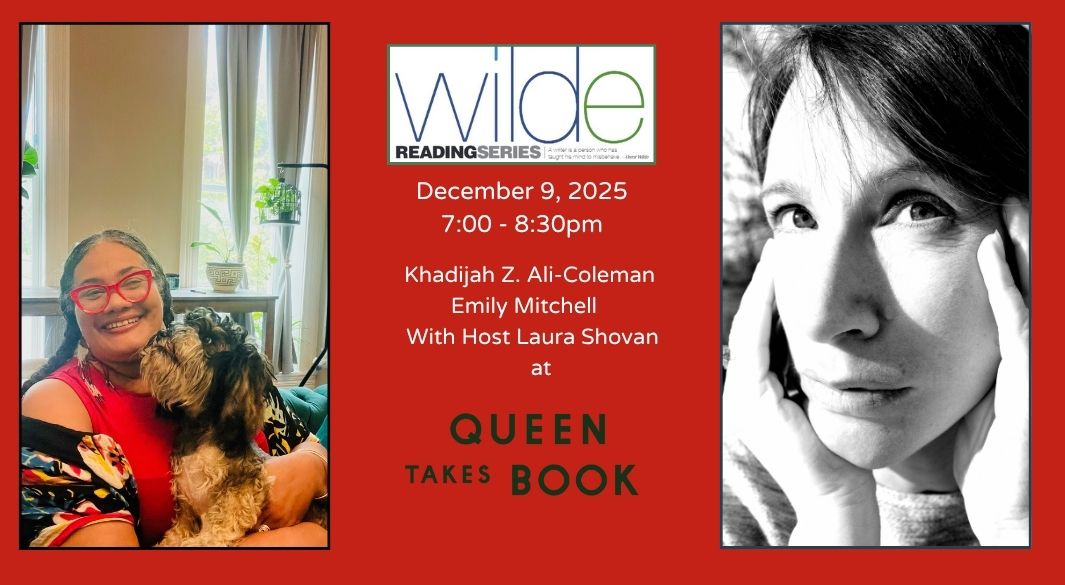
HoCoPoLitSo welcomes all to the December edition of the Wilde Reading Series, which this year proudly opens its tenth season of highlighting local authors in Howard County. This month’s reading features Khadijah Z. Ali-Coleman and Emily Mitchell, hosted by Laura Shovan. Please join us at independent bookstore Queen Takes Book on Tuesday, December 9th at 7 p.m., at 6955 Oakland Mills Rd, Suite E, Columbia MD, 21045. Please spread the word— bring your friends, family and students! Light refreshments will be served and books by the readers available for sale.
An open mic follows the featured authors and we encourage you to participate. Please prepare no more than five minutes of performance time, about two poems, and sign up when you arrive.
Below, get to know Khadijah and Emily!
Who is the person in your life (past or present) that shows up most often in your writing?
Khadijah: I would say, as of late, my mother tends to be featured the most in my writing. My book that I published in 2024, For the Girls Who Do Too Much, was literally a poetic memoir of sorts exploring the many ways I responded to the death of my mother in 2014 over the years while contending with the many feels associated with growing into middle-age. The second person would be my daughter. I wrote poetry to and about her even before she was born.
Emily: I suppose that in different ways my immediate family, my sister, mom, dad and husband, appear in my work a lot but not as themselves. My stories are not directly autobiographical so they are always heavily altered or composite, mixed together with other people, including people I don’t know well at all, like someone I went to middle school with, my piano teacher from when I was six or a coworker from my first job. There are situations that I’m interested in consistently, maybe, instead: people who leave their homes and travel long distances; loneliness and the search for home and community; the pain of being left out, forgotten or excluded. Those themes come back again and again whether I want them to or not.
Where is your favorite place to write?
Khadijah: I don’t have a favorite place to write. But, I do like to write when I am alone and when I feel like I am not being rushed or expected to be somewhere soon. So, the weekends, after hours and early mornings are favorite times usually.
Emily: I have a big, lovely desk that is really a mid-century dining table in my home office which is where I do my creative work. There’s a print of the Chagall painting Les Amoureux hanging over it. More than any other artist, Chagall seems to me to show in his figures how human beings are always trying to overcome our separateness from each other and I like to be reminded of that while I work. But, really, I can write anywhere as long as I don’t have distractions.
Do you have any consistent pre-writing rituals?
Khadijah: I have so much structure and organization in my day-to-day work as a professor, and when leading the organizations I’ve founded that I purposefully ask the universe for grace to share messages with me to give insight on how to move towards a new creative project. I often feel like my poems, songs, and plays are outputs from this channeling, particularly when writing about times in history where I wasn’t born. I listen for the messages by being observant of what is around me and catching my attention. I think about the themes that have been predominant during the week. I reflect on the feelings I have that I just can’t shake. These are the things that want to explore and find ways for them to become part of the story I will write.
Emily: I usually sit and meditate for about 15 minutes before I begin. Especially when I’m working on a longer project, this helps with managing all the uncertainty that is an unavoidable part of writing fiction, not knowing where the story is going, or who the characters are or whether I can make it work in the end. I started doing this in order to finish my second novel and it has become a necessary part of my routine since then.
Who always gets a first read?
Khadijah: My daughter and her dad, who has been my artistic partner for over 20 years, are usually the ones to read something first if it is for a book, song, or solo performance. The women in my artist collective, Liberated Muse, see things first if it is a script or song they will perform. My daughter’s notes are second to none. She has given the best feedback I’ve ever received until recently when I received feedback from Howard County Poet Laureate Truth Thomas. The two of them are really thorough writers and editors when it comes to poetry.
Emily: I have a wonderful writing group that I’ve been meeting with for more than a decade now and they are usually the first ones to see my work.
What is a book you’ve read more than twice (and would read again)?
Khadijah: I have read so many books repeatedly. I didn’t realize how much a creature of habit I was until I started getting those Spotify end-of-the-year recaps that show you who you’ve listened to all year. They tell me every year that I listen to the same 5–10 people.
With books, I fear it may be the same, at least when I think about it based on my age. Anne of Green Gables was probably that book when I was a child. Kindred by Octavia Butler in my 20’s. The Alchemist. The Four Agreements. Read books like that on repeat late 20’s and 30’s. From 20s to now in my 50’s, I have some staples. Many books by Toni Morrison— Sula, Beloved and Song of Solomon. May be time to revisit them again for the tenth time.
Emily: Mrs. Dalloway by Virginia Woolf.
What is the most memorable reading you have attended?
Khadijah: I am not sure if it was a reading, but I enjoyed the only time I saw Nikki Giovanni in person at Busboys and Poets in Washington DC 10 or 11 years ago. She was sharing so many amazing stories of her life and her relationships with people like Maya Angelou and James Baldwin.
Emily: This is tough because I’ve been to so many good ones over the years! I’m going to go with a reading by the poet Bridgit Pegeen Kelly from her book Song some years before she passed away. She was very shy and didn’t love being up at the podium but as soon as she started reading the whole room went absolutely silent, riveted by her words. I’m going to cheat and make a second pick: LaToya Watkins reading from Holler, Child, last year at University of Maryland was also just amazing, a reading that will stay with me for a long time.
• Khadijah Z. Ali-Coleman is author of the published and forthcoming poetry collections Halos for Heroes, Friends and a Few People I Don’t Like (2026), A Park Stands on All of Our Graves (2025), For the Girls Who Do Too Much (2024), The Summoning of Black Joy (2023), the children’s book Mariah’s Maracas (2018) and co-editor of the book Homeschooling Black Children in the US: Theory, Practice and Popular Culture (2022). She served as the second Poet Laureate of Prince George’s County, MD from 2023–2025. Based in Baltimore, Maryland, Khadijah Ali-Coleman is a multi-genre writer and founding director of Black Writers for Peace and Social Justice, a 501(c)(3) nonprofit, and the multidisciplinary arts group Liberated Muse. She is an associate professor in the Humanities Department at Coppin State University.
Visitors are welcome to her personal website, khadijahali-coleman.com, and to her Substack. You can also connect with her on Instagram and Facebook as @KhadijahOnline.
• Emily Mitchell is the author of The Last Summer of the World (W. W. Norton, 2007), a novel, and two short story collections, Viral (W. W. Norton, 2015), and The Church of Divine Electricity (University of Wisconsin Press, 2025). Her short fiction has appeared in Harpers’, Ploughshares, The Sun, The Southern Review, The Missouri Review and elsewhere. She serves as fiction editor of New England Review and teaches at the University of Maryland. As well as writing, she likes reading, running, biking, cooking, traveling, studying Spanish, universal healthcare, stopping climate change and, in case that all wasn’t nerdy enough, she’s recently been getting into bird-watching.
Emily invites you to read a recent interview about her new collection with the writer Allison Wyss for Adroit Journal. Her regular home on the web is emilymitchellwriter.com, and she is on Instagram as @elbmitchell.

Wilde Readers of November: Geoffrey Himes & Linda Rabben

HoCoPoLitSo welcomes all to the November edition of the Wilde Reading Series, which this year proudly celebrates its tenth season of highlighting local authors in Howard County. This month’s reading features Geoffrey Himes and Linda Rabben, hosted by Linda Joy Burke. Please join us at independent bookstore Queen Takes Book on Tuesday, November 11th at 7 p.m., at 6955 Oakland Mills Rd, Suite E, Columbia MD, 21045. Please spread the word— bring your friends, family and students! Light refreshments will be served and books by the readers available for sale.
An open mic follows the featured authors and we encourage you to participate. Please prepare no more than five minutes of performance time, about two poems, and sign up when you arrive.
Below, get to know Geoffrey and Linda!
Who is the person in your life (past or present) that shows up most often in your writing?
Geoffrey: My wife.
Linda: Too many people to name here.
Where is your favorite place to write?
Geoffrey: Anywhere—as long as the words come.
Linda: Anywhere.
Do you have any consistent pre-writing rituals?
Geoffrey: I always carry a notebook in my pocket, just in case.
Linda: No.
Who always gets a first read?
Geoffrey: My poetry writing group on Zoom.
Linda: Nobody always gets a first read. Sometimes my husband, sometimes a friend.
What is a book you’ve read more than twice (and would read again)?
Geoffrey: The Collected Poems of Wallace Stevens.
Linda: Middlemarch.
What is the most memorable reading you have attended?
Geoffrey: Allen Ginsberg at HoCoPoLitSo.
Linda: Jan Karski, Polish diplomat who denounced German genocide during WWII, spoke at the University of Iowa about 40 years ago.
• Geoffrey Himes’ poetry has been published by Best American Poetry, December, Gianthology, Innisfree, Salt Lick and other publications. He has written about popular music and theater for the Washington Post, New York Times, Rolling Stone and many more since 1977. His book, In-Law Country: How Emmylou Harris, Rosanne Cash and Their Circle Fashioned a New Kind of Country Music, was published in 2024, followed by his book, Willie Nelson: The Stories Behind the Music, in 2025. His two books of collaborative poems with Grace Cavalieri, Fables from Italy and Beyond and The Third Voice, were published in 2025. His first book of solo poems, Today I Am an Orphan: The Shorter Poems of Geoffrey Himes, is due in 2026.
Geoffrey’s podcast and most recent writing can be found at the Hard Rain & Pink Cadillacs on SubStack.
• Author, anthropologist and human rights activist Linda Rabben did research in and on Brazil for more than 30 years, worked as a researcher for Amnesty International, and coordinated a project for Lutheran Immigration and Refugee Service. Linda’s 12 published books include Book of Changes, a collection of her poems, and Through a Glass Darkly: The Social History of Stained Glass in Baltimore. She is an associate research professor of anthropology at the University of Maryland.
Linda’s home on the web is found at wordworker.net.




